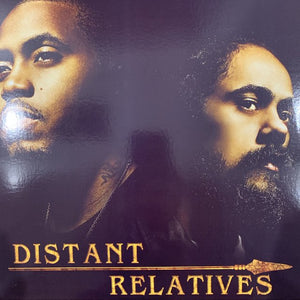

But then the song ends, and it's back to the preaching.Damian’s manager Dan Dalton, whose Dalton Entertainment Group’s partnership with Roc Nation began in 2016, came up with the Distant Relatives concept. The song is mostly pretty bland, five minutes of sloganeering before Nas suddenly turns ugly, wondering if his ex-wife cheated on him, bringing up Bruce Lee's family curse, raging at nobody in particular, then breaking everything off with haughty style: "See a nigga disappearing with the baddest honeys in the whole spot, yeeah." With all the heavy-handed philosophizing all around it, it's pretty thrilling to hear Nas suddenly going all "Oochie Wally" on us, if only for a second. Nas sounds most like himself in the last minute of "Strong Will Continue". When these guys stop trying to be positive and just vent, they do great things. "As We Enter" and "Patience" respectively sample Mulatu Astatke and Amadou and Mariam, both to great effect. "Land of Promise" is devastating old-school dancehall toughness, not far removed from Marley's own "Welcome to Jamrock", with Nas finding new cadences for his dusky monotone. "Nah Mean" puts a nasty mid-90s NY rap beat in service of some ferocious snarling from both principals. On tracks like this one, the dorm-room philosophizing gets a little thick.īut even with all that, the album is still a true collaborative affair, two deeply talented guys with amazing, evocative voices finding common ground and exploring it. The track "My Generation" is all the album's worst impulses put on display, a sickly attempt at gospel with Joss Stone yowling all over the chorus and a truly dogshit Lil Wayne guest verse- all in service of fuzzy, feel-good preachiness. The production, mostly from Marley and brother Stephen, tends too often toward stifled, Grammy-bait guitar solos and tinkling, expensive R&B sheen. Nas strays into either the too-general ("I reach 'em like Bono/ So get rid of your self-sorrow") or puzzling paranoia ("If satellites is causing earthquakes, will we survive it?"). In trying to make what basically amounts to a modern-day Bob Marley album, they've both pushed themselves away from their strengths. Nas, meanwhile, is best at tense, tactile details: The feeling of gunpowder burning your nostril hair, the dank smell of piss in the project elevator. On his best tracks, he brings less of his father's wizened optimism and more of the gravelly, demonic snarl of dancehall-schooled avengers like Sizzla or Capleton.

Marley's never done his best work shooting for inspirational. And first single and album opener "As We Enter" promises great things, Nas and Marley furiously trading off tag-team punchlines over a track that perfectly splits the difference between dusty NY boom-bap and warm post-dancehall reggae.īut too often on Distant Relatives, Nas and Marley fall into a sort of middlebrow funk, kicking overripe platitudes over sunny session-musician lopes and letting their self-importance suffocate their personalities. State of Mind" beat and Nas giddily playing hypeman on "Welcome to Jamrock". Onstage together at SXSW, they had a lively chemistry, Marley chatting madly over the "N.Y. Five years ago, Nas guested on Marley's "Road to Zion" and sounded great doing it. Nas and Damian Marley are both sons of celebrated musical figures, so god knows they probably have plenty to talk about.

So it makes sense for him to link up with the scion of one of the most universally beloved figures in all of music, making a back-to-basics move that pushes him away from rap and tabloid politics. Nas is in a tough spot right now, coming off of a couple of half-successful, attention-grabbing concept albums and a costly, spiteful public divorce. There's something of that same nagging well-intentioned vagueness to Nas' latest venture, as well. It's meant to be a triumphant ending, but it's frustratingly out-of-reach, missing the specificity that could've made it satisfying. We just hear "Africa," like the entire continent is some gigantic symbol for rebirth and redemption. We don't learn where in Africa he moves, or what he does when he gets there. At the end of the 1998 Hype Williams film Belly, Nas, playing a reformed outlaw named Sincere, leaves behind the violence and betrayal of his old life and moves to Africa.


 0 kommentar(er)
0 kommentar(er)
